Decision due on plans for opencast mine on Northumberland coast


Banks Mining has received a letter on behalf of the Housing, Communities and Local Government Secretary, Robert Jenrick, stating that the Government hopes to announce its verdict on the Highthorn surface mine, between Widdrington and Druridge Bay, no later than Tuesday, April 7.
The company’s environment and community director, Mark Dowdall, said: “At a time of national crisis, retaining ready access to the essential resources UK industry needs is more important than ever.
Advertisement
Hide AdAdvertisement
Hide Ad“A positive decision on Highthorn would help give some much-needed confidence around North East jobs and investment, as well as contributing to the UK’s balance of payments and delivering tangible benefits to local communities – and all at no extra cost to the Exchequer.”
It is now almost four years since the application, for the extraction of three million tonnes of coal and a total of 20,000 tonnes of fireclay and sandstone over a five-year period with total operations lasting seven years, was approved by Northumberland County Council, having been submitted in October 2015.
After being called in, it was subsequently recommended for approval by the Planning Inspectorate, but the then Communities Secretary Sajid Javid opted to turn it down in March 2018.
Banks then lodged a Hight Court challenge on the grounds that there were serious errors in the legal basis on which Mr Javid made his decision, disregarding the recommendation of the Government-appointed planning inspector following a 14-day inquiry in June 2017.
Advertisement
Hide AdAdvertisement
Hide AdAfter a two-day hearing in October 2018, the Honourable Mr Justice Ouseley handed down a decision which found in favour of Banks Mining, describing the reasoning behind Mr Javid’s decision to reject the planning inspector’s findings as ‘significantly inadequate’.
Banks’ case for the Highthorn scheme is that it would create at least 100 well-paid, full-time jobs on the site, invest £87million into the Northumberland economy, keep a total of £120million within the UK economy by not importing coal that would otherwise come from overseas suppliers, and make supply-chain contracts worth a total of £48million available to locally-based businesses.
Mr Dowdall said: “Given the extraordinary public health and economic challenges facing the country, both now and once the pandemic has been dealt with, and the fact that the North East is already facing unprecedented levels of business closures and employee lay-offs, it would give a real boost to the region’s economy for the Government to approve this application – the only beneficiaries of a refusal would be the coal industries of Russia, the US and Australia.
“Around 30 million tonnes of coal have been imported into the UK since Northumberland County Council first approved the Highthorn scheme in July 2016, a figure 10 times higher than the three million tonnes we want to mine there.
Advertisement
Hide AdAdvertisement
Hide Ad“The UK currently imports around 86% of its coal that it uses, even though the carbon transport costs of dragging this coal halfway around the planet are enormous, and while UK industry still needs essential minerals like coal and fireclay for things like steel and cement manufacturing and to make bricks for house building, which it will for at least the next 10 to 15 years, there is no environmental or economic sense whatsoever in sourcing supplies from thousands of miles away when they are readily available at home.”
However, objectors say that the mine would destroy a stunning part of Northumberland, while resulting in significant carbon emissions, when a climate emergency has now been declared by Northumberland County Council and the North of Tyne Combined Authority.
In February, Prime Minister Boris Johnson announced that the deadline for the phase-out of coal from Britain’s energy system is planned to be brought forward a year to October 1, 2024.
Other concerns include damage to tourism, the impact on wildlife and ecology, road issues and the negative effects on residential amenity, including noise, dust and air pollution.
Advertisement
Hide AdAdvertisement
Hide AdA statement on the Facebook page of the campaign group Save Druridge says that it has seen the Government’s letter, but it adds: ‘However, as we all know, Parliament have adjourned early for Easter and will not be back until the 21st April. So there is a strong possibility that the decision could be delayed.’
Mr Dowdall added: “While we hope that this latest letter indicates that a decision is near, previous experience with other similar letters suggests we can’t be sure that it is until a judgement actually appears, so for the sake of the regional economy, our highly skilled North East workforce and the global climate, we would strongly urge the Secretary of State to allow us to start work at Highthorn as soon as he can.”